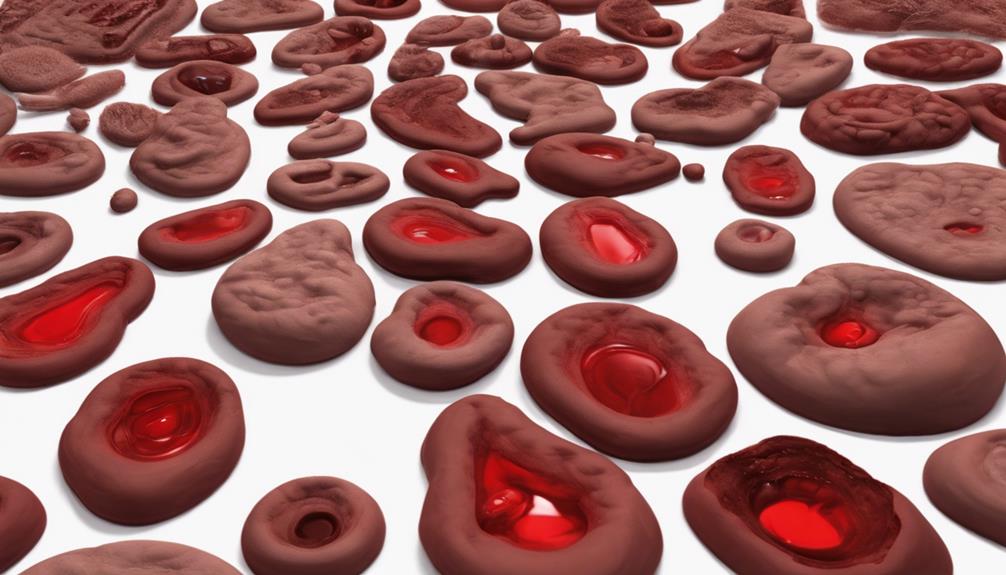As we were analyzing the data, a notable trend emerged, shedding light on a vital aspect of newborn health that often raises concern among parents and caregivers. Understanding the presence of blood in a newborn's stool can be perplexing, but our detailed guide aims to provide clarity on this matter.
From common causes to signs of concern and strategies for management, our insights can help navigate this sensitive issue with confidence. Let's explore the intricacies of newborn poop and blood, unraveling the mysteries to guarantee the well-being of our little ones.
Key Takeaways
- Differentiate between normal and pathological causes of blood in newborn stool.
- Bright red blood may indicate anal fissures, swallowed blood, or milk protein allergy.
- Dark, tarry stools could signify meconium or gastrointestinal bleeding.
- Prompt consultation for persistent blood is crucial for timely intervention.
Common Causes of Blood in Newborn Stool
Examining the various factors contributing to blood in newborn stool reveals key insights into potential underlying health conditions. Among the common causes identified, cow's milk protein allergy (CMPA) stands out, responsible for 53.3% of cases. This allergy emphasizes the importance of monitoring a baby's diet, especially formula-fed infants.
Swallowed blood syndrome, found in 10.0% of neonates with bloody stools, can be alarming but is usually benign and resolves on its own. However, healthcare providers must still evaluate and confirm the diagnosis to make sure proper management.
Necrotizing enterocolitis (NEC) is a serious condition, with stage II or greater cases contributing to 8.3% of bloody stools in newborns. Preterm infants face a higher risk of NEC, highlighting the need for vigilant monitoring in this vulnerable population.
Additionally, non-specific enteritis accounts for 7.3% of cases, underlining the importance of early detection and appropriate management to prevent potential complications. Understanding these common causes is important for prompt intervention and effective treatment.
Recognizing Normal Blood in Stool

How can healthcare providers and parents differentiate between normal blood in newborn stool and pathological causes to guarantee proper management?
When it comes to recognizing normal blood in stool, understanding the nuances is essential. Here are some key points to bear in mind****:
- Swallowed Blood Syndrome: This common occurrence in the early postnatal period can lead to the presence of streaks or small amounts of blood in the stool, often originating from swallowed maternal blood.
- Appearance of Maternal Blood: Maternal blood in the baby's stool can vary in color, appearing either bright red or dark, depending on the time it takes to pass through the digestive system.
- Harmless Nature: The normal presence of blood in newborn stool due to swallowed maternal blood is typically harmless and resolves on its own without intervention.
- Differentiation: It's essential to differentiate between normal blood in stool and pathological causes, as normal blood shouldn't be accompanied by concerning symptoms such as persistent bleeding or changes in vital signs.
Signs of Concern in Newborn Stool
When evaluating newborn stool, observing for specific signs can help identify potential concerns that require medical attention.
Bright red blood in a newborn's stool may be due to anal fissures, swallowed blood syndrome, or a milk protein allergy. Conversely, dark, tarry stools could indicate the presence of meconium or signal gastrointestinal bleeding.
If mucus or pus is present in the stool, it might suggest an infection or inflammation within the digestive tract. Black or maroon-colored stools could be a sign of gastrointestinal bleeding from sources like the upper digestive tract.
It's important to consult a healthcare provider promptly if persistent blood is noticed in your newborn's stool to rule out serious conditions such as necrotizing enterocolitis. Being vigilant for these signs can help in early detection and appropriate management of any underlying issues that may arise in your newborn's stool.
Seeking Medical Advice for Bloody Stools

What steps should be taken if bright red blood is observed in a newborn's stool?
When bright red blood is noticed in a newborn's stool, it can be alarming for parents. In such cases, seeking immediate medical advice is important to identify the underlying cause and guarantee the baby's well-being. Here are some important points to take into account:
- Consult a Healthcare Provider: Reach out to a healthcare provider promptly to assess the situation and determine the cause of the blood in the stool.
- Consider Possible Causes: Various factors like anal fissures, infections, or allergic reactions could lead to bloody stools in newborns.
- Monitor for Changes: Keep a close eye on the stool for any persistent blood and changes in color, consistency, or frequency.
- Prompt Medical Evaluation: If the blood in the stool persists, seeking a medical evaluation is essential to rule out any serious conditions like gastrointestinal bleeding.
Managing Blood in Newborn Poop
Upon noticing blood in a newborn's stool, immediate attention and appropriate management are essential to safeguard the infant's health and well-being. The causes of blood in newborn poop can vary, including conditions like cow's milk protein allergy (CMPA), swallowed blood syndrome, or necrotizing enterocolitis (NEC).
It's important to carefully monitor the color, consistency, and frequency of blood in newborn poop to identify any potential underlying issues. Exclusive breastfeeding has been shown to potentially delay the onset of bloody stools related to NEC in newborns. Fortunately, most cases of bloody stools in newborns are self-limiting, with only a small percentage requiring surgical intervention.
It's important to emphasize that timely detection and proper management of serious underlying causes of blood in newborn poop are paramount for the well-being of the newborn. By staying vigilant and seeking appropriate medical care when needed, parents and caregivers can ensure the best outcomes for their little ones.
Frequently Asked Questions
What Does It Mean When a Newborn Has Blood in Their Poop?
When a newborn has blood in their poop, it can indicate various issues like gastrointestinal conditions or allergies. Consulting a healthcare provider is important if bright red streaks or blood clots are present consistently.
Can Overfeeding Cause Blood in Stool?
Yes, overfeeding can cause blood in a newborn's stool. When we provide too much milk, their digestive system can get overwhelmed, leading to irritation and inflammation. Monitoring feeding cues and adjusting amounts can prevent this issue.
When Should I Take My Baby to the ER for Blood in Stool?
If your baby has blood in their stool, seek immediate medical attention for evaluation. Dark or persistent blood, associated with other symptoms like dehydration or lethargy, necessitates an urgent visit to the ER. It's essential for prompt assessment.
Is Blood in Newborn Diaper Normal?
Blood in a newborn's diaper is not considered normal and requires evaluation by a healthcare provider. Causes may include various conditions. Prompt assessment is vital to guarantee the baby's well-being. Consult a healthcare professional immediately.
Conclusion
So, turns out newborn poop can tell us a lot more than we thought. Who knew a diaper change could be so revealing?
Remember, spotting blood in your baby's stool may seem alarming, but it's not always a cause for panic. Stay informed, stay vigilant, and don't be afraid to reach out for help if needed.
After all, who knew baby poop could be such a complicated topic to unravel?









